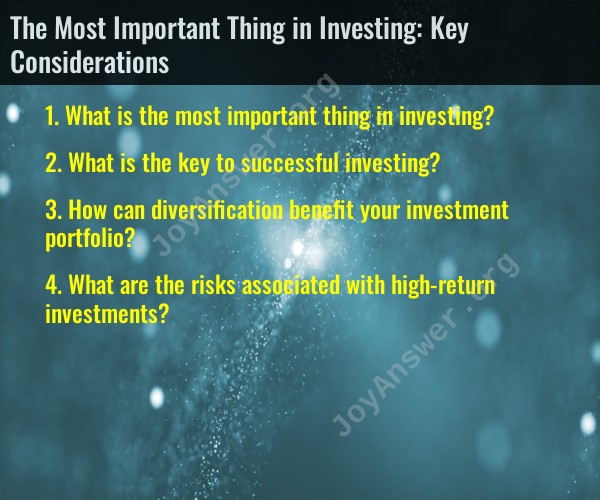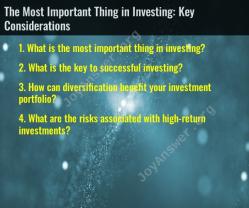What is the most important thing in investing?
The most important thing in investing can vary from one individual to another depending on their financial goals, risk tolerance, and investment strategy. However, there are several key considerations that are universally important for all investors:
Goal Setting: Before you start investing, it's crucial to define your financial goals. Are you investing for retirement, buying a home, funding your child's education, or achieving some other objective? Your goals will influence your investment strategy and time horizon.
Risk Tolerance: Understanding your risk tolerance is essential. How much volatility and potential loss can you comfortably handle? Your risk tolerance will guide your asset allocation and choice of investments.
Diversification: Diversifying your investments across different asset classes (stocks, bonds, real estate, etc.) and within each class can help spread risk. Diversification is a fundamental strategy to mitigate potential losses.
Time Horizon: Your investment time horizon is the period over which you plan to invest before needing the funds. A longer time horizon generally allows for more aggressive investment strategies and can help you weather market fluctuations.
Asset Allocation: Your asset allocation is the mix of different types of investments in your portfolio. It should align with your goals, risk tolerance, and time horizon. Rebalancing your portfolio periodically is essential to maintain your desired allocation.
Costs and Fees: Pay attention to investment costs and fees. High fees can eat into your returns over time. Consider low-cost investment options, such as index funds or ETFs.
Research and Due Diligence: Educate yourself about the investments you're considering. Research companies, funds, or assets before investing. Understand the potential risks and rewards.
Emotional Control: Emotions can lead to impulsive decisions that harm your investments. Maintaining emotional control, particularly during market fluctuations, is crucial for long-term success.
Regular Contributions: Consistently contributing to your investments, such as through automatic contributions to a retirement account or regular purchases of stocks or funds, can help you benefit from dollar-cost averaging.
Reinvestment of Dividends and Interest: Reinvesting dividends and interest earnings can compound your returns over time. This strategy can accelerate the growth of your investments.
Staying Informed: Stay informed about economic and financial market trends. While long-term investors don't need to react to every market movement, staying informed can help you make informed decisions.
Review and Adjust: Periodically review your investment portfolio to ensure it aligns with your goals and risk tolerance. Adjust your investments as needed to stay on track.
Professional Advice: Depending on your financial situation, it may be beneficial to seek advice from a financial advisor or planner. They can help you create a customized investment plan and provide guidance on reaching your financial goals.
Ultimately, the most important thing in investing is to have a clear plan and strategy that align with your goals and risk tolerance. Staying disciplined, diversified, and informed while controlling your emotions are essential components of successful investing.
What is the key to successful investing?
The key to successful investing is to have a plan and to stick to it. This means setting investment goals, choosing investments that are appropriate for your risk tolerance and time horizon, and rebalancing your portfolio regularly.
It is also important to do your research and to understand the risks associated with different investments. This will help you to make informed investment decisions.
How can diversification benefit your investment portfolio?
Diversification is the process of investing in a variety of different assets. This can help to reduce your risk and to improve your overall returns.
When you diversify your portfolio, you are not putting all of your eggs in one basket. This means that if one investment performs poorly, it will not have as much of an impact on your overall portfolio.
There are a number of different ways to diversify your portfolio. You can invest in different asset classes, such as stocks, bonds, and cash. You can also invest in different sectors of the economy.
What are the risks associated with high-return investments?
High-return investments are generally associated with high risk. This means that there is a greater chance that you could lose money on your investment.
It is important to understand the risks associated with high-return investments before you invest. You should also make sure that you have a financial plan in place in case you lose money on your investment.
Here are some of the risks associated with high-return investments:
- Market risk: Market risk is the risk that the value of your investment will decline due to changes in the overall market.
- Inflation risk: Inflation risk is the risk that the value of your investment will decline due to inflation.
- Interest rate risk: Interest rate risk is the risk that the value of your investment will decline due to changes in interest rates.
- Credit risk: Credit risk is the risk that the issuer of your investment will default on their debt.
- Liquidity risk: Liquidity risk is the risk that you will not be able to sell your investment when you need to.
It is important to understand these risks before you invest in high-return investments. You should also make sure that you have a financial plan in place in case you lose money on your investment.
Investing can be a complex and risky endeavor. It is important to do your research and to understand the risks associated with different investments before you invest. You should also have a financial plan in place in case you lose money on your investment.



